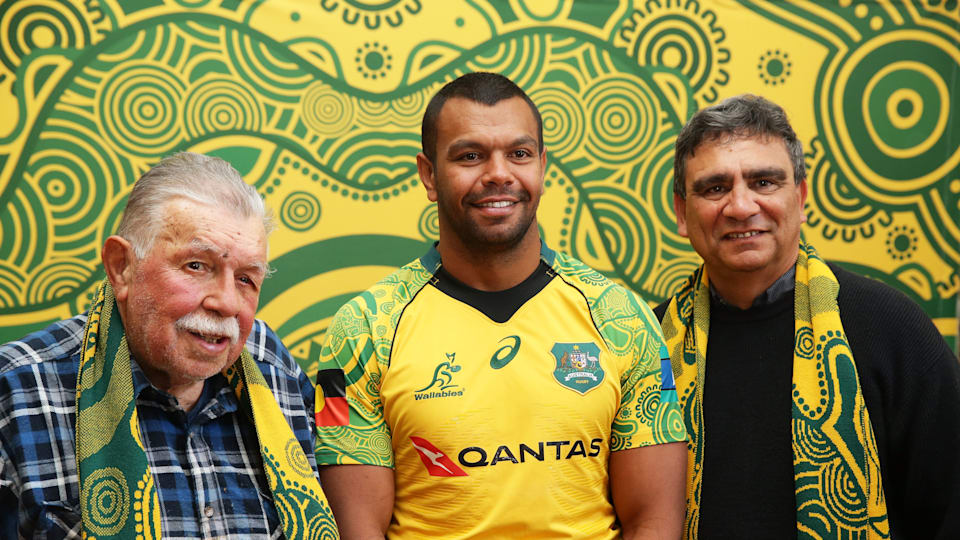Mullenjaiwakka Lloyd McDermott's extraordinary impact on indigenous sport in Australia

On International Day of the World's Indigenous Peoples, Olympics.com looks at how one man created real change in his Aboriginal community, and beyond, by making the most of the one opportunity available to him.
In 1962, the winger for the Australian rugby union squad, Mullenjaiwakka Lloyd McDermott opted not to play as an ‘honorary white’ on a tour of apartheid-stricken South Africa.
By 2019, the Wallabies coach Michael Cheika announced that Australia would wear its indigenous-inspired strip at that year's Rugby World Cup in Japan.
The man who was key to it all had sadly passed away, aged 79, just 12 days before the big reveal at the annual fundraiser for his eponymously named Rugby Development Team initiative.
But the proud Mununjali and Wakka Wakka man had left his mark, including being instrumental in Australia rugby's Aborigine artwork-inspired jersey design, first worn in a Bledisloe Cup match against long-time rivals New Zealand in 2017.
On 9 August, the International Day of the World's Indigenous Peoples, Olympics.com celebrates the impact of one extraordinary man on his nation's culture.
Mullenjaiwakka Lloyd McDermott, an Aboriginal Australian icon.
One opportunity - taken
McDermott was born to a farm labourer in Eidsvold, Queensland in 1939, a time when the community was strictly segregated.
When buying food, the family would have to "wait until all the white people had left the shops before they would serve them, if they got served at all", revealed his daughter Philippa McDermott to NITV (National Indigenous Television) in 2019.
Stopped from going to school because Aboriginal kids were banned, McDermott didn't start his education until aged 11. The family managed to scrape enough money together to secure private school tuition for just one year for the teenager, and the following year, McDermott received a scholarship based on his sporting and academic achievements.
He went on to complete four degrees – including science and criminology – speak German and Latin fluently and become Australia's first Aboriginal barrister.
Oh, and have an international rugby career.
The last one was, sadly, all too brief.
Proud heritage
Aged 23, McDermott played rugby for Queensland Reds while studying law at university, with his form shown during 10 games against the likes of Fiji, France and the New Zealand All Blacks resulting in his selection to play as a winger for Australia on a tour of New Zealand.
"It was a real shock, the fact that an Aboriginal person had come up," said former Wallaby Gary Ella, who represented Australia six times between 1982 and 1988 and is himself a Yuin and Bidjigal man. "He was the first recognised Aboriginal person to play, and he played with honour."
After playing two Test matches for the Wallabies, McDermott's rugby career was over after refusing to participate in a 1963 tour to South Africa, in which, due to apartheid, he could only take part if he accepted being declared, "an honorary white".
"That cost him greatly," one of his closest friends and fellow legal professional, Tony McAvoy SC told NITV in 2019. "He never played for the Wallabies again after he refused to play against South Africa.
"The message we get from Lloyd is, you can’t be what other people want you to be. I think it’s a lesson we all need to remind ourselves from time to time."
But McDermott wasn't done, turning his attention to his legal career, and the impact he could make there.
Paying it forward
Completing university in the 1950's, McDermott worked in the Commonwealth Deputy Crown Solicitor's Office, before being admitted to the bar in New South Wales in 1972, becoming the first Aboriginal barrister in Australia. A rewarding, impactful career followed including giving his time and energy in promoting opportunities for indigenous youth, wherever he could.
In 2009, the Mullenjaiwakka Trust for Indigenous Legal Students was established to assist indigenous law students towards a career at the bar.
Meanwhile, in recognition of how sport and education gave him his own opportunities, the Lloyd McDermott Rugby Development Team (the 'Lloydies') was established in 1991 to use rugby as a tool to provide opportunities and education to enrich the lives of indigenous kids.
Initially aimed at increasing Aboriginal and Torres Strait Islander participation in rugby XV, the initiative was expanded into various forms of the game including youth sevens programs, a schoolgirls development camp and a local club for disadvantaged youngsters.
One of those Lloydies, Maurice Longbottom, was a member of the Australian men's rugby seven's squad at the Tokyo 2020 Olympics.
"Such a privilege to be representing my country at the Olympics, but even more honoured to be wearing a piece of my culture when I take the field," Longbottom said of his specially designed boots showcasing Aboriginal artwork.
Australia's Olympic kit for 2021 also included a shirt incorporating the artwork of Indigenous artist and Olympic boxer Paul Fleming.
Dreamtime
On McDermott's passing, players past and present, wore black armbands in honour of his legacy.
As it happened, the Queensland Reds were playing in South Africa, and before the game, a tribute was read to the players, which closed with this:
"He never got the opportunity to play in South Africa, but tonight you get the chance to play for him and embrace the spirit of ‘Mullenjaiwakka’ as you all run out on the field. Tonight, we play for Lloyd."